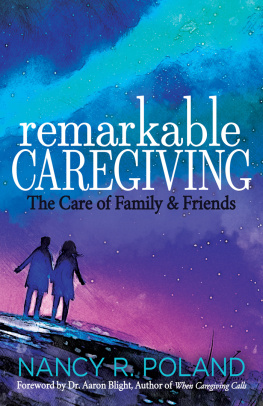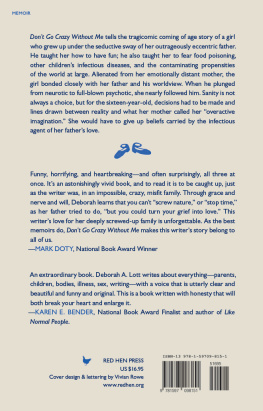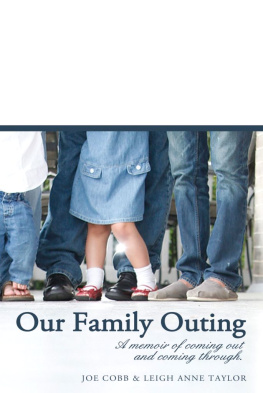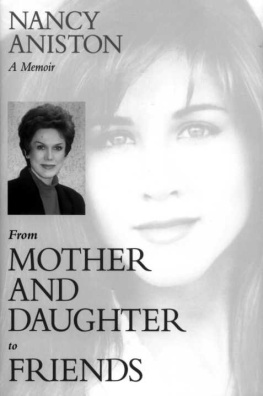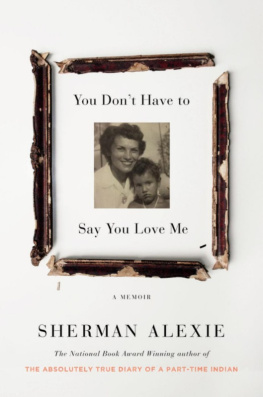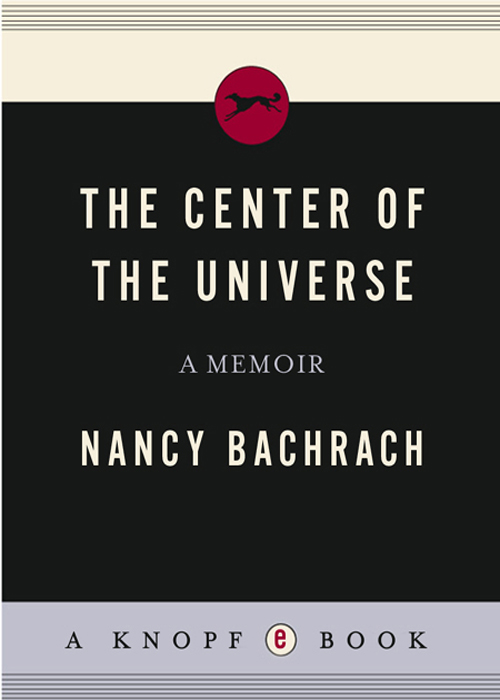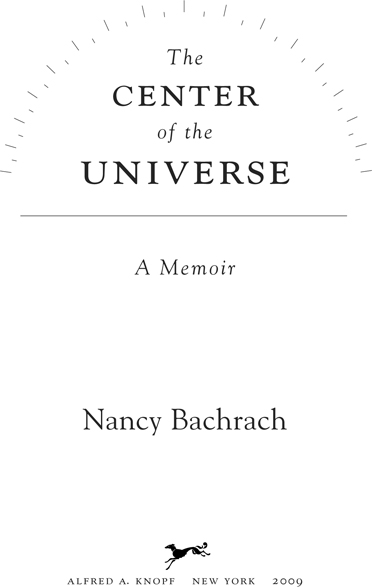Author's Note
Memory is so fragile that even perspective can distort it, but this is a work of nonfiction, mostly about my mother. If she had written it, she'd have spun the material into a juicy novel, maybe an epic, because she loved invention and the lift of a good lie. But she also approved of my telling the truth, or as close to the truth as I've ever been able to get.
Resemblance to actual persons, living or dead, is largely unavoidable in a true story, due to the nature of reality. So names have been changed, and events have been gently reshuffledsomething they do on their own anyway, over time. A few living persons have been airbrushed, but the dead were fair gameand although my pen is a blunt instrument, no one was actually killed in the making of this book.
ONE
Things Fall Apart
MEMORIAL DAY WEEKEND , 1983
In the ancient forest on the Right Bank of Paris lies a jewel-like island where Napoleon, just back from the Alps, built a Swiss chalet. Emerald lawns and ruby flowers shimmer beside a sapphire lake as peacocks stride by. On a sunny Sunday morning in May, I am ensconced on the chalet's terrace, now a caf, replenishing more energy than my leisurely jog has exhausted. Around me, lazy hands stir sugar cubes in slow circles and spread butter on crusty baguettes. These are the only signs of industry in a city where the principal exercises are digestion and strolling, where laissez-faire is practiced and preached, where intermission is the pace of life.
I saunter through the woods toward my apartment as the ladies of the night flee daylight like vampires stumbling upon a cross. I know one of the Brazilians by name, since I pass her most mornings as she's wrapping up her night's work in tissues. Alexandro has just become Alexandra. Like her, I came to Paris to reinvent myself three years ago. Although I had no surgery, I did change my name, and while no one calls me a prostitute, sometimes I feel like one, admittedly, in another old and unlofty profession, advertising.
I've been relocated from headquarters in New York to tackle a marketing emergency for an important toiletries clientthe launch of France's first, sorely needed antiperspirant. Our team on the Seineninety-nine people smoking and loitering above a gas stationwon the coveted assignment (code-named Stink-o) even though they've failed for a decade to browbeat their countrymen into American bar soap. Which is why someone very high up at bar soap headquarters, someone with a good nose but a rarely used passport, smells an untapped market for deodorants over here, and although I can imagine the logic that led to this conclusion (and my relocation), the person who reached it hasn't had to sit through forty focus groups in unventilated conference rooms in the provinces. Getting the natives to adopt a roll-on, stick, or spray will require a paradigm shift, I'm learning, a long and winding road that's synonymous with a huge media budget and then, usually, failure. What would make the Frenchwho relish the bleu on their cheese and their skin, who have a whole class of things they fondly call stinkywhat would make them plug up their pores with wax to placate and enrich our big American client? This is the onerous marketing dilemma I face daily in my otherwise idyllic life in the City of Light.
To help me think through the Stink-o conundrum, I have the Semisa squadron of French semiologists, not just translators but also linguists and cogitators, who are deconstructing the semantics of our antiperspirancy muddle. Not solving it exactly, just scrutinizing it in the Gallic way, ad nauseam. For my edification, the Semis are writing a treatise on perspiration, its cultural heritage, its evolutionary value, its distillation of primeval body essences. My task is to develop a successful campaign against sweat, when it rivals the madeleine in the collective olfactory unconscious.
Tucked behind a manicured garden in the Sixteenth Arrondissement is the elegant rue where I livein a Beaux-Arts town house with a tiny filigreed elevator, where I would imagine Maurice Chevalier crooning to Leslie Caron even if Gigi weren't playing on the concierge's stereo. From my apartment on the top floorfour rooms with high ceilings and crown moldings, eight times the size of my New York studio, thanks to the value of the dollar under Reaganthere's a postcard view of the tip of the Eiffel Tower, which I am admiring through open windows, when my phone rings.
The connection has a bad echo, so it's an overseas call, although it's two in the morning in the States.
Surely, as the poet said, some revelation is at hand.
My brother, Ben, weeping hello, sounds both frantic and measured. He tells me he has terrible news. He says I'd better prepare myself.
I have never had any idea what to do after someone says prepare yourself, since the warning itself is an angst infusion.
Sssxxzzz is dead, Ben says, but the ocean is sloshing against underwater cables, making puddles of noise in his words.
Who? Who's dead? This is the moment when time collapses, when what hasn't yet been said feels like dj vu.
DAD! he shouts. DAD is dead.
The echo repeats his words. Dad is deaddad is dead.
Our father is fifty-eighta vigorous, athletic, handsome fifty-eight. Boyish is the first thing people call him, not always as a compliment.
Dad is dead? How?
The boatthe boat.
That is explanation enough.
Facing me is a photo of our father aboard his secondhand fourteen-year-old cabin cruiser, the Mr. Fix It, unwrapping my last birthday giftan inflatable life raft. Spouting the Coast Guard motto, Semper Paratus, he is, or was, constantly fiddling with nautical instruments whose failures are legendary. Last year's close call came fifty miles off Martha's Vineyard, with no land in sight, when he and my mother happened upon a sudden stormwhich functioning radar or a transistor radio would have disclosed. It swept the deck furniture overboard and almost did the same to them before they strapped themselves into their seats. So it is easy to picture Mr. Fix It himself chomping on a cigar like Ralph Kramden, piloting blind from his flying bridge under a starless sky, next to a mute radio, as an unforeseen tidal wave washes over his boat (again) and drags him into the Atlantic. I glimpse his black hair bobbing in the ocean and his hands flailing as a shark circles and pokes him in the chest.



